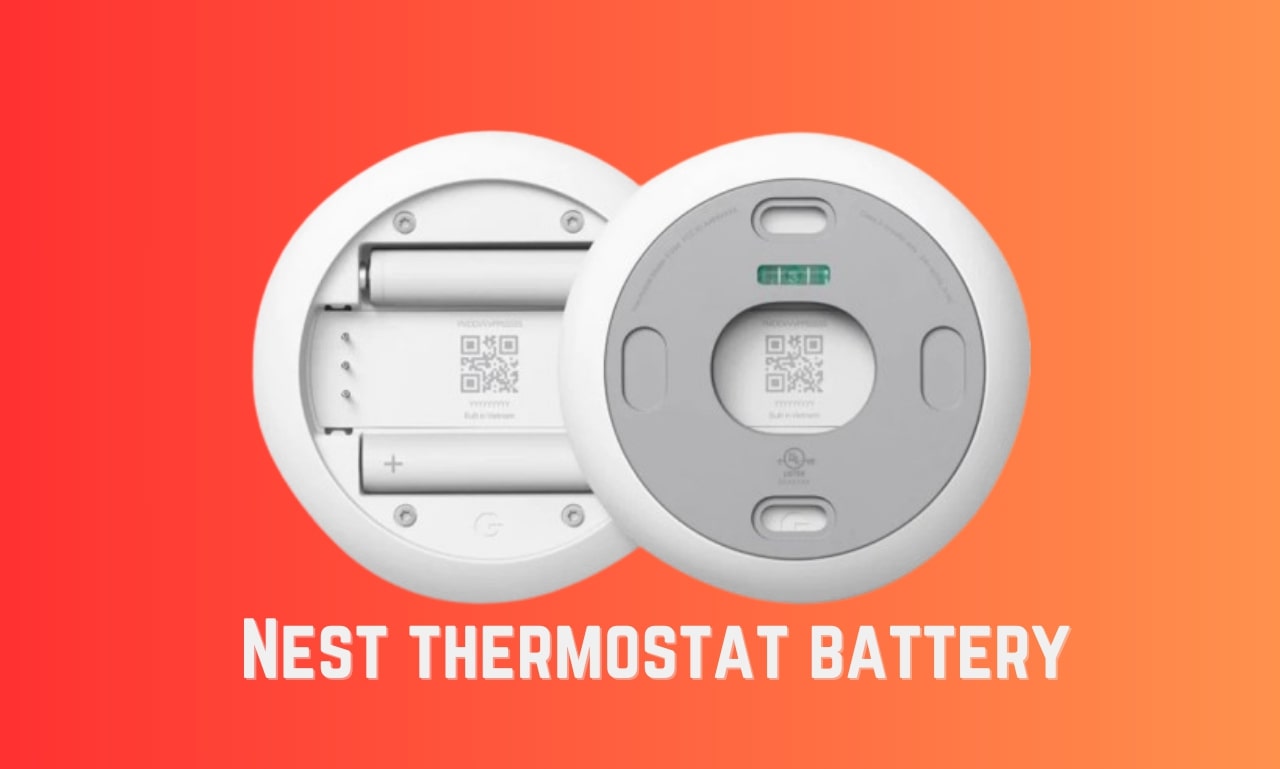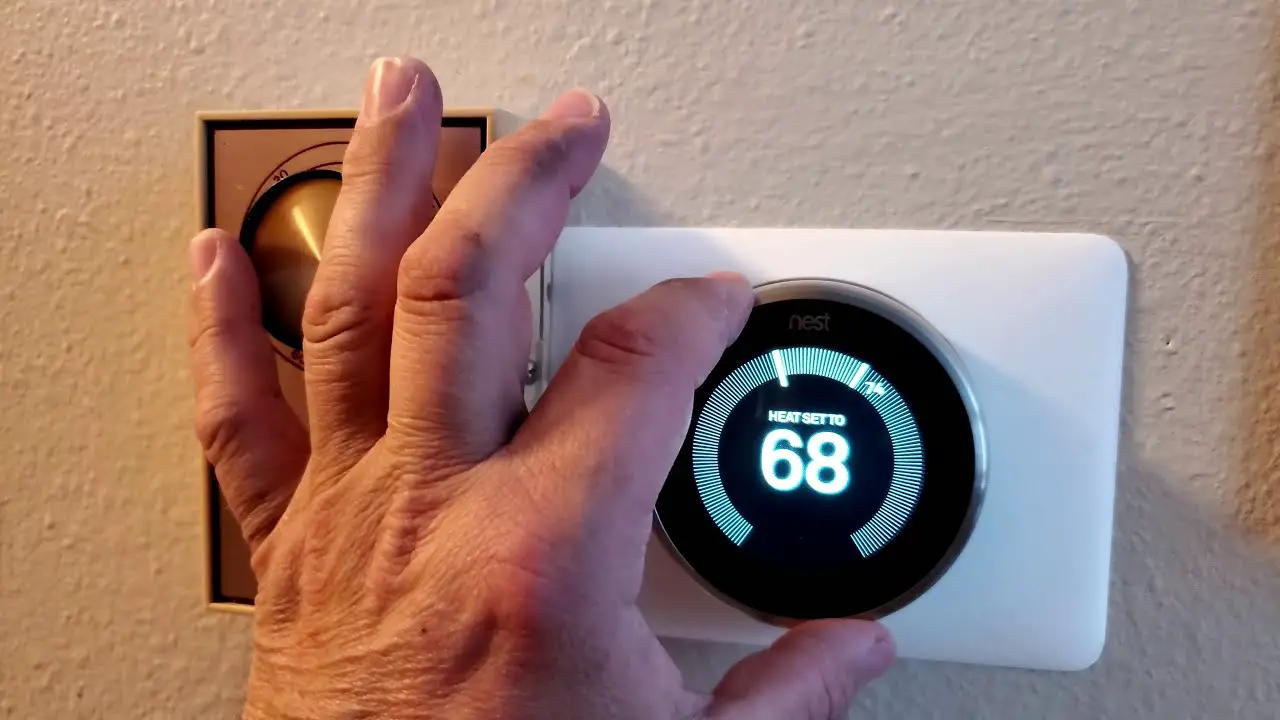Check Best Thermostat Pricing in Amazon
** As an Amazon Associate, I earn from qualifying purchases.
A Nest Thermostat battery typically lasts 1-2 years. Frequent usage and settings can affect its longevity.
Nest Thermostats are popular for their energy-saving features and smart home integration. They offer users greater control over their home’s heating and cooling systems. The thermostat’s battery life is crucial for its uninterrupted performance. Regular monitoring and timely replacements ensure efficient operation.
Users should be aware that settings and usage patterns can impact battery longevity. Investing in a Nest Thermostat is a step towards a more energy-efficient home. The device not only enhances comfort but also helps in reducing utility bills. Regular maintenance and understanding its battery life can maximize the benefits of this smart device.
Introduction To Nest Thermostat Battery Life
The Nest Thermostat is a smart device that helps you control your home’s temperature. It also saves energy and money. Understanding the battery life of your Nest Thermostat is important. This knowledge helps ensure the thermostat works efficiently.
The Importance Of Battery Health
Battery health directly affects the performance of your Nest Thermostat. A healthy battery ensures the device runs smoothly. It also helps in avoiding unexpected shutdowns. Regular monitoring of battery life is crucial for optimal performance.
Factors Affecting Battery Longevity
Several factors can impact the longevity of your Nest Thermostat battery. These factors include:
- Usage frequency: Frequent adjustments drain the battery faster.
- Wi-Fi connectivity: Constant connection to Wi-Fi uses more battery.
- Temperature settings: Extreme settings can affect battery life.
Here is a quick overview of the factors in a table:
| Factor | Impact on Battery |
|---|---|
| Usage Frequency | High usage drains battery faster |
| Wi-Fi Connectivity | Constant connection uses more battery |
| Temperature Settings | Extreme settings affect battery life |
Understanding these factors helps you manage your Nest Thermostat battery better. Effective management prolongs the life of your device and keeps it running smoothly.

Credit: www.pinterest.com
Nest Thermostat Battery Basics
The Nest Thermostat is a cutting-edge device that enhances home comfort and efficiency. A key component of its functionality is the battery. Understanding the battery is crucial for optimal use and maintenance. Let’s explore the battery type, specifications, and charging mechanism.
Battery Type And Specifications
The Nest Thermostat uses a built-in rechargeable lithium-ion battery. This type of battery is known for its longevity and efficiency. It ensures the thermostat functions seamlessly, even during short power outages.
| Specification | Details |
|---|---|
| Battery Type | Rechargeable Lithium-ion |
| Capacity | 380 mAh |
| Voltage | 3.7V |
| Charge Time | 2 hours |
Understanding The Charging Mechanism
The Nest Thermostat charges its battery through the HVAC system’s wiring. When the thermostat is connected to the system, it draws power to keep the battery charged.
- Charging Source: HVAC system wiring
- Power Consumption: Minimal, ensuring efficiency
- Backup: Battery provides power during outages
In some cases, the battery might need a manual charge. You can do this using a USB cable connected to a power source.
- Remove the thermostat display from the base.
- Connect the USB cable to the display.
- Plug the other end into a power source.
- Wait for the battery to charge (approximately 2 hours).
Regularly check the battery level to ensure your thermostat runs smoothly. A fully charged battery means uninterrupted performance and energy savings.
Average Battery Lifespan
The Nest Thermostat is known for its smart features and energy efficiency. But how long does its battery last? Understanding the average battery lifespan is essential for maintaining optimal performance. This section will explore what to expect from your Nest and compare it to other smart thermostats.
What To Expect From Your Nest
The average battery lifespan of a Nest Thermostat is between one to two years. Most Nest Thermostats are designed to be connected to the HVAC system. This connection provides a constant power supply. However, the internal battery acts as a backup during power outages.
Regular usage can impact the battery life. Frequent adjustments and high usage of the display may reduce the battery life. But, in typical conditions, you can expect the battery to last up to two years.
Comparing To Other Smart Thermostats
How does the Nest Thermostat compare to other smart thermostats in terms of battery life? Below is a comparison table:
| Smart Thermostat | Average Battery Lifespan |
|---|---|
| Nest Thermostat | 1-2 years |
| Ecobee Thermostat | 2-3 years |
| Honeywell Thermostat | 1-2 years |
| Sensi Thermostat | 1-2 years |
Ecobee Thermostats generally have a slightly longer battery life of 2-3 years. Honeywell and Sensi Thermostats have similar battery lifespans to Nest.
- Nest Thermostat: 1-2 years
- Ecobee Thermostat: 2-3 years
- Honeywell Thermostat: 1-2 years
- Sensi Thermostat: 1-2 years
Each thermostat’s battery life can vary based on usage and settings. Nest Thermostats stand out for their smart features and reliable performance. Regular maintenance and careful usage can help extend battery life.
Signs Of Battery Wear
Understanding the signs of battery wear in your Nest Thermostat can help you maintain its performance. Batteries don’t last forever. Recognizing the signs early can save you from unexpected issues.
Recognizing A Declining Battery
A declining battery shows several signs. The thermostat display might become dim or unresponsive. You may notice that the device restarts frequently. These are common signs of a weak battery.
Another sign is the Wi-Fi connection drops. A failing battery can’t support the thermostat’s functions, including Wi-Fi. If your device struggles to stay connected, check the battery.
Lastly, the thermostat may show a low battery warning. This message is a clear indicator that your battery needs attention.
Troubleshooting Common Issues
If you experience any of the signs above, try these steps:
- Check the battery level in the thermostat settings. If it’s low, replace the batteries.
- Restart the thermostat. Sometimes a simple restart can resolve minor issues.
- Ensure proper installation of the thermostat. Incorrect installation can drain the battery quickly.
If problems persist, you might need to reset the thermostat to factory settings. This can solve more complex issues.
Battery Life Table
The table below provides a quick reference for the average battery life of a Nest Thermostat:
| Battery Type | Average Lifespan |
|---|---|
| Rechargeable Lithium-Ion | 1-2 years |
| AAA Alkaline | 6-12 months |
Maintaining your Nest Thermostat’s battery helps ensure it runs smoothly. Recognize the signs of wear and troubleshoot as needed.
Maximizing Your Nest’s Battery Life
The Nest Thermostat is a smart device that helps control your home’s temperature. To keep it working well, you need to make sure the battery lasts long. Here are some tips to maximize your Nest’s battery life.
Check Best Thermostat Pricing in Amazon
** As an Amazon Associate, I earn from qualifying purchases.
Best Practices For Maintenance
Follow these best practices to keep your Nest Thermostat running smoothly:
- Check the wiring: Ensure all wires are connected properly. Loose wires can drain the battery quickly.
- Clean the device: Dust and dirt can affect the device’s performance. Use a soft cloth to clean it regularly.
- Adjust the display settings: Lower the brightness and reduce the screen timeout. This can help save battery power.
- Control the temperature settings: Avoid frequent changes in temperature. Constant adjustments can use more battery power.
Software Updates And Battery Efficiency
Keeping your Nest Thermostat updated can help improve battery life. Here’s how:
- Enable automatic updates: Go to the settings menu and turn on automatic updates. This ensures your device always has the latest software.
- Check for updates manually: If automatic updates are off, check for updates regularly. Navigate to the settings menu and select “Check for Updates”.
- Review update notes: Read the notes for each update. Some updates specifically improve battery efficiency.
Software updates can fix bugs and improve performance. This helps your Nest Thermostat use less battery power.
By following these tips, you can ensure your Nest Thermostat battery lasts as long as possible. Proper maintenance and regular software updates are key to a long-lasting device.

Credit: www.reddit.com
Replacing Your Nest Battery
Your Nest Thermostat is a smart device designed to make your life easier. But, its battery does not last forever. Knowing when and how to replace the battery can keep your home comfortable. This guide will help you with this important task.
When And How To Replace
The Nest Thermostat will alert you when the battery is low. You may also notice some signs. Your thermostat may lose its Wi-Fi connection. The screen might become unresponsive. These are clear signals that it’s time to replace the battery.
To replace the battery, follow these steps:
- Turn off the thermostat by pressing the display.
- Remove the display from the base by pulling it straight off.
- Locate the battery compartment at the back of the display.
- Remove the old battery carefully.
- Insert the new battery, ensuring it is placed correctly.
- Reattach the display to the base.
- Turn the thermostat back on.
Finding The Right Replacement Battery
Choosing the right battery is crucial for the optimal performance of your Nest Thermostat. The recommended battery type is a 3.7V 380mAh Li-ion rechargeable battery. Always use the same type as the original to avoid any issues.
You can find the right battery from various sources:
- Online retailers like Amazon or eBay.
- Local electronics stores.
- Official Nest or Google stores.
Ensure the battery is of high quality to keep your thermostat running smoothly. Avoid cheap, low-quality batteries as they may not last long.
Impact Of External Factors
The longevity of your Nest Thermostat battery can be influenced by various external factors. Understanding these factors helps optimize battery life. Below, we explore how temperature and power outages affect battery performance.
Effect Of Temperature On Battery Performance
Temperature plays a significant role in battery performance. Extreme temperatures can reduce battery efficiency. In cold environments, the battery may deplete faster. In hot settings, the battery can overheat, reducing its lifespan.
| Temperature Range | Effect on Battery |
|---|---|
| Below 32°F (0°C) | Faster depletion |
| 32°F – 95°F (0°C – 35°C) | Optimal performance |
| Above 95°F (35°C) | Potential overheating |
Power Outages And Battery Drain
Frequent power outages can lead to battery drain. Nest Thermostats rely on electrical power. During an outage, the device switches to battery mode. Prolonged outages force the battery to supply power longer.
To mitigate battery drain during outages:
- Ensure a reliable power source.
- Use a surge protector.
- Regularly check the battery status.
By being mindful of these external factors, you can extend the battery life of your Nest Thermostat.
Conclusion: Ensuring Optimal Performance
Ensuring your Nest Thermostat performs at its best is essential for energy savings and home comfort. The battery life plays a crucial role in this. By understanding how long the battery lasts, you can make informed decisions to maintain optimal performance.
Key Takeaways
- Battery Life: A fully charged Nest Thermostat battery typically lasts around 1-2 hours.
- Charging: Regular charging via the base or USB ensures uninterrupted service.
- Energy Efficiency: Keeping the thermostat charged helps maintain energy efficiency.
Future Of Smart Thermostats And Battery Innovation
The future of smart thermostats looks promising with advancements in battery technology. New batteries are becoming more efficient and longer-lasting. This means less frequent charging and more reliable performance.
With innovations in battery technology, users can expect smarter energy management. This will lead to even greater savings on energy bills and a more comfortable living environment.
| Feature | Current | Future |
|---|---|---|
| Battery Life | 1-2 hours | Several hours to days |
| Charging Time | 1-2 hours | Minutes to an hour |
In conclusion, staying informed about your Nest Thermostat’s battery life and advancements in battery technology can ensure you get the best performance from your device.

Credit: www.techbanu.com
Frequently Asked Questions
How Do I Know If My Nest Thermostat Needs A New Battery?
Your Nest Thermostat may need a new battery if it frequently disconnects from Wi-Fi or shows a low battery warning.
How Often Do You Need To Charge A Nest Thermostat?
You usually don’t need to charge a Nest Thermostat. It charges itself through your HVAC system’s wiring.
What Happens When A Nest Battery Dies?
When a Nest battery dies, the device loses power. It stops functioning until recharged or replaced. Ensure regular charging to maintain performance.
How Long Do Batteries Last In A Thermostat?
Thermostat batteries typically last between 6 months to 2 years. Regular maintenance ensures longer battery life. Always check the user manual for specific recommendations.
Conclusion
Ensuring your Nest Thermostat battery lasts longer is simple with proper care. Regular maintenance and updates are key. Keep an eye on battery levels and charge when needed. By following these tips, you can enjoy seamless smart home comfort for years.
A well-maintained thermostat enhances efficiency and convenience.
Check Best Thermostat Pricing in Amazon
** As an Amazon Associate, I earn from qualifying purchases.


